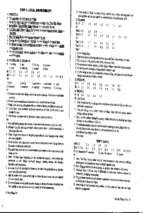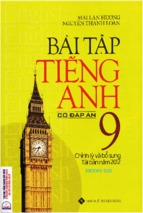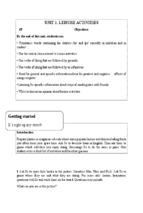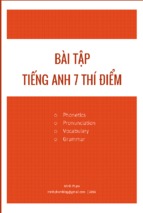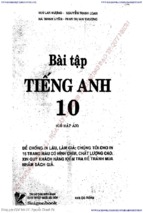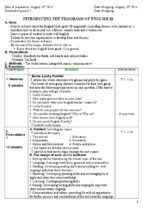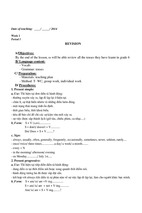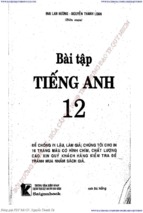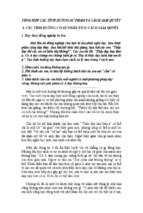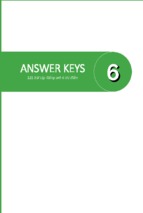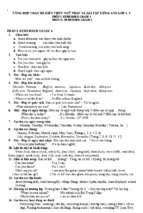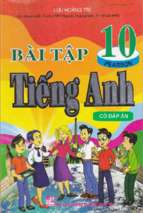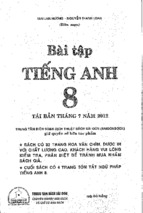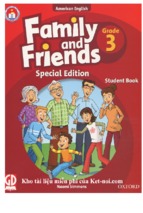Basic
grammar
points
1
REVIEW OF STRUCTURE
A/ ADVERBIAL CLAUSES :
I/ Clause Of Concession: Though, Although, Even Though, Even If………
+ But , Despite , In Spite Of ( Adj + Noun , V-Ing , Possessive + Noun, The + Noun)
+ Whatever ( Adj/ Object, Subject), However, Adj + As + S + V.
a/ S1 + V …………But + S2 + V……………
-> S1 + V +……….., S2 + V ……………..
Ex: They live in poverty but they don’t feel unhappy. ( although)
-> They live in poverty, they don’t feel unhappy.
b/ Although +S1 + V ………… + S2 + V…………… ( S1 = S2 )
-> In spite of + Ving +……….., S2 + V ……………..
Ex: Although Bill took a taxi, he still came late for the meeting. ( although)
-> In spite of taking a taxi, Bill still came late for the meeting.
c/ Although +NOUN + BE+ ADJ ………… + S2 + V…………… ( “Noun” chæ vaät)
-> In spite of + ADJ + NOUN +……….., S2 + V ……………..
Ex: Although the weather was bad, the flight wasn’t cancelled. ( although)
-> In spite of the bad weather, the flight wasn’t cancelled.
c/ Although +S + BE+ ADJ ………… + S2 + V…………… ( “S” chæ ngöôøi)
-> In spite of + Possessive adj / possessive case + NOUN +……….., S2 + V …………
Ex: Although he was ill, he still went to work. ( although)
-> In spite of his illness, he still went to work.
d/ Although +IT + BE+ ADJ ………… + S2 + V……………
-> In spite of + THE + NOUN +……….., S2 + V …………( “Noun”chò thôøi tieát )
* Noun + Y = Adj ( fog, rain, storm, sun, cloud, snow, wind, )
Ex: Although it was foggy, the flight was not delayed. ( although)
-> In spite of the fog, the flight was not delayed.
e/ Although + S + V + NOUN …..= Whatever + NOUN + S + V,
Ex: We must study well though we have any kinds of difficulties. ( whatever)
-> Whatever ( kinds of ) difficulties we have, we must study well .
f/ Whatever + NOUN + S + V = No Matter What + NOUN + S + V,
Ex: No matter what experience he has , he can’t repair that machine.
-> Whatever experience he has , he can’t repair that machine.
II/ Clause Of Reason (Cause): Because , As , Since…
+ Because Of + Noun Phrase = Because + Clause( gioáng nhö “Although & in spite of”)
+ So, So ………That, If, To Inf…
+ S + Stop / Prevent + O + From + V-ing = Because of
Ex: The teacher is sick, so we have no class tomorrow. (because)
-> Because the teacher is sick. We have no class tomorrow.
Ex: That restaurant is so dirty that nobody wants to eat there. (because)
-> Because that restaurant is dirty, nobody wants to eat there.
Ex: She went to the post office to send a letter.
-> Because she wanted to send a letter, she went to the post office.
Ex: The fog prevented us from going out.
-> Because of the fog, we didn’t / couldn’t go out.
2
III/ Adverb Of Result : So / Such …………That……
+ Because, Too, Enough……
1/ S + V + So + Adj / Adv + That ………………
+ Uses of Adj & Adv ( Verb followed by adj )
+ The ending letters of adjective.(-ful/ tive/ ous )
+ Use of “ So many & so much”
Ex: He has so much work to do that he can’t go to the cinema with us.
2/ S + V + Such + (a/ an) + Adj + Noun + That ………………
+ Use of “a / an”.
Ex: It is such a difficult lesson that we can’t understand it.
Ex: Mary is too young to get married.-> Mary isn’t old enough to get married.
IV/ Clauses Of Condition: If, As/So Long As, Provided That, On Condition That, In Case, Suppose/
Supposing, Even If
+ Unless, Or, Or Else, Otherwise, And.
+ Because, As, Since, So, Therefore, That’s Why.
1/ If ………not = Unless
Ex: If he doesn’t phone her immediately, he won’t get any information.
-> Unless he phones her immediately, he won’t get any information.
* Notes: Neáu trong caâu coù “nothing, no one, nobody” -> “ something, someone, somebody”
“No -> Many, Seldom, Rarely -> Always”
Ex: He will die if nobody sends him for a doctor.
-> He will die unless somebody sends him for a doctor.
2/ V1 ………………………….Or / or else / Otherwise + S + Will + V1
-> Unless + S + Verb in the present tense, S + Will + V1
Ex: Do those exercises carefully or you‘ll fail the exams. (You)
-> You‘ll fail the exams unless you do( if you don’t do) those exercises carefully.
Ex: Hurry up …………………you will be late for school.
a. unless
b. or
c. because
d. if
3/
a/ Because / As / Since + S1 + Verb…………………., S2 + Verb……………………
- If + S1 + Verb ……………………….., S2 + Verb ………………………….
b/ S1 + Verb …………………………….., So / Therefore/ That’s why + S2 + Verb ………………….
- If + S1 + Verb ……………………….., S2 + Verb ………………………….
+ Tense in present – Type II
+ Tense in past
- Type III
+ Use the Verb in opposite form ( Negative -> Affirmative )
Ex: Mai can’t get the job because she doesn’t speak English well.
-> Mai spoke English well, she could get the job.
Ex: I was very busy so I couldn’t go to the meeting.
-> If I hadn’t been busy, I could have gone to the meeting.
4/ Without + V-Ing / Noun = Unless + S + Verb / There + Be + Noun
Ex: Without taking the taxi, we will be late.
-> Unless we take a taxi, we will be late.
Ex: Without rain, we couldn’t stop the forest fire completely.
3
-> If there were no rain, we couldn’t stop the forest fire completely.
5/ But for + Noun = If it were not for/ hadn’t been for + Noun
Ex: But for the storm, we would have had a good crop.
-> If it hadn’t been for the storm, we would have had a good crop.
* Notes:
Ex: He gave me a lift to the station, otherwise I might have missed the train.
-> If he hadn’t given me a lift to the station, I might have missed the train.
Ex: But for your help, I couldn’t have finished the work.
-> If you hadn’t helped me, I couldn’t have finished the work.
V/ Clause Of Comparison: As….As, Not So/As……As, More/ less ……Than, The Most……..
1/ Positive degree:
a/ Equality: S + V + ………..+ As + Adj / Adv + As + S + Va.
Ex: She works as hard as her friend does. ( Caâu cho saún coù “Too”)
Ex: This table is one meters long. That one is two meters long.
-> That table is twice as long as this one.
b/ Unequality: S + Verb + Not + As / So + Adj / Adv + As + S + Va.
-> S + Verb + Less + Adj / Adv + Than + S + Va.
Ex: The market is less crowded than usual today.
-> The market is not so / as crowded as usual today.
2/ Comparative degree:
a/ S + Verb + More + Long-Adj / Adv + Than + S + Va.
+ Short-Adj/ Adv+ ER + Than + S + Va.
Ex: Mr.Phan doesn’t drive as carefully as he used to.
-> Mr. Phan drives more carelessly than he used to.
Ex: Hung is not good at Chemistry as Minh.
-> Minh is better at Chemistry than Hung.
b/ S + Verb + The most + Long-Adj / Adv + ( Noun) + Place
+ Short-Adj/ Adv+ EST
Ex: No restaurant in this city is as good as that one.
-> That is the best restaurant in this city.
c/ The + Adj / Adv ( SSH) + S + V, The + Adj / Adv ( SSH) + S + V.
Ex: The older she gets, the more beautiful she is.
d/ More and More + Long Adj / Adv ( Short Adj / Adv + ER)
Ex: The lesson is more and more difficult.
Ex: It is hotter and hotter.
* Notes :
- Short Adjective: young, hot cold, cheap, late…
+ Two syllables ending in “y, le, et, ow, er” : happy, easy, early, pretty, busy,
simple, gentle, quiet, narrow, mellow, clever, bitter.
- Long Adjective : More than two syllables and “Adj + ly”
- How to add “Er / Est”
+ nice – nicer, big – bigger ( ending in “y, w, x”-> without double), happy –
happier
+ Irregular Adjective “good, far, many, bad, little”
4
* Adjective order:
- articles (a, an, the) , P.adj ( my, his, her), determiners (this, that , these , those)
- ordinal numbers ( first, second….)
- cardinal numbers ( one, two, some, several..)
- adverb degree ( too, very, extremely)
- quality ( lovely, beautiful, difficult, interesting, good…)
- size ( small, big, huge, little)
- age ( new, old, young)
- length ( long, short, tall)
- shape ( round, square)
- colors ( black, white, blue..)
- nationality ( Vietnamese, Italian, Chinese..)
- purposes /metal ( reading, walking, steel, nylon, cotton…)
- head noun( book, car…)
* Question with “HOW”
- how old: ( soá + tuoåi / at the age of + soá)
- how tall / high : ( soá + tall / high , the height of)
- how far : ( soá + mile / kilometer )
- how fast : (soá + mile / kilometer + per hour)
- how deep ( soá + deep, the depth of )
- how long ( soá + meter/ mile long , the length of, for + soá + tgian)
- how wide ( soá + wide, in width)
- how often ( once/ twice + a + time)
- how many / much + noun : ( soá + noun)
- how much : ( soá + money, soá + pound )
VI/ Clause Of Time:
When, As, ( On + Ving), While, As Soon As, Before, After, Since, Until, By The Time.
1/ Time in the sentence is in the past ( yesterday, last , ago, in pat time) or verb in past tenses
a/ After / as soon as + S + Had + V3, S + V2
-> After + V-Ing = After + S + Had + V3
Ex: After finishing our work ,we went home.
-> After we had finished our work ,we went home.
b/ Before / by the time + S + V2 , S + Had + V3
-> Before + V-Ing = Before + S + V2
Ex: I made sure I had the car keys before locking the door.
-> Before I locked the door, I made sure I had had the car keys.
c/ While + S + Verbs in past continuous , S + Verb in simple past or past continuous
- On + V-Ing = while + S + Verbs in past continuous
Ex: On walking to school, I saw my teacher.
-> While I was walking to school, I saw my teacher.
* Caùc ñoäng töø dieãn ñaït caùc haønh ñoäng ngaén luoân ôû thì quaù khöù ñôn : “ see, hear, meet,
go, come, get, arrive, start, begin, enter”
d/ When / As + S + V, S + V ………………..
+ QKÑ : haønh ñoâïng ngaén hay söï vieäc xaûy ra sau
5
+ QKTD : haønh ñoäng daøi hay söï vieäc vaãn coøn tieáp dieãn khi haønh ñoäng thöù nhaát xaûy ra.
d1/ On + V-Ing = when + S + Verbs in past continuous or simple past.
Ex: On driving home from office , I saw an accident.
-> When I was driving home from office , I saw an accident.
d2/ When / While + S + be……., S + V …………… ( hai ñoäng töø ñeàu duøng ôø thì QKÑ)
Ex: When he was at school, he studied very well.
d3/ When + S + V in simple past ……….., S + V in past perfect ( “Already / So + S + V”)
Ex: When I got to the station, the train had already left.
Ex : When we arrived at his house , he had gone to work, so we didn’t meet him.
d4/ S + Had + No Sooner + V3 ……………..Than + S + Verb in simple past
S + Had + Hardly / Scarely + V3 ……………..When + S + Verb in simple past
Ex: We had no sooner left home than it started to rain.
Ex: No sooner had we left home than it started to rain.
e/ S + verb in present perfect …………..+ Since + S + verb in simple past.
e1/ S + Verb in simple past …………………………….+ Time + Ago.
-> It is / was + Time + since + S + Verb in simple past …………………………….
Ex: He lost his job three months ago.
-> It is three months since he lost his job.
e2/ S + Have / has Not + V3 ……………………+ For + Time.
-> It is + Time + Since + S +( Last) + Verb in simple past.
-> The last time ( when)+ S + Verbs in simple past ………..+ Was + Time + Ago.
Ex: We haven’t seen Minh for two years.
-> It is / has been two years since I last saw Minh.
-> The last time we saw Minh was two years ago.
e3/ Uses of “For” and “Since”.
f/ S + Verb in simple past + Not …………………….Until + Clause in simple past / Phrase of time
-> It was not until + Clause / Phrase + That+ S + Verb in simple past.( maõi cho ñeán khi)
Ex: Tom didn’t begin to read until he was ten.
-> It was not until Tom was ten that he began to read.
Ex: The noise next door did not stop until midnight.
-> It was not until midnight that the noise next door stopped.
2/ Time in the sentence is in the future ( tomorrow, next ) or verb in the future
S + Verb in the future ………………+ Conj + S + Verb in the present.
Ex : When I meet him tomorrow, I will give him your letter.
Ex: You will fell better after you have something to eat.
Ex: You will have something to eat. You will feel better.
-> After you have something to eat, you will feel better.
3/ Notes on tenses
a/ The simple past tense:
+ Formula: S + V2 – Did not + V1 – Did + S + V1?
+ Usage: “yesterday , last , ago, in + time in the past”
: From …………to …………. ( from 1990 to 1995)
Ex: Jane ……………………just a few minutes ago.
a. leaves
b. has left
c. had left
d. left
6
Ex: My uncle lived in Hanoi since 1990 to 1998, but he is now living in Hue.
A
B
C
D
Ex: Nobody was hurt in the accident , …………………..?
a. was he
b. did he
c. were they
d. did they.
* Tag- question:
S + Verb in affirmative …………………, Va + Not + S?
S + Verb in negative ………………………, Va + S?
+ Va ( Auxiliary verbs : be, have, do, can, may, must, shall , will)
+ Subject in the tag question must be pronouns “I, we, you , they , he, she, it”
- Some/ Any/ No/ Every + One / Body = They
- Some/ Any/ No/ Every + Thing = It
- “No” : Khoâng duøng “Not” trong phaàn caâu hoûi ñuoâi.
b/ The simple present:
+ Formula: S + V1 / Vs - Do / Does + Not + V1 – Do / Does + S + V1?
+ Usage : “Sometimes, often, usually, always, seldom, rarely, never”
“ Every + Time ( day, week, month ……..) ”
“ Once / Twice / Three times + A + Time (day, week, month ……..)”
Ex: My father seldom ………… tea after meal.
a. drink
b. drank
c. drink
d. is drinking
Ex: They go to this club ……………………
a. a once week
b. once a week
c. a week once d. once week
c/ The simple future:
+ Formula: S + will / Shall + V1
+ Usage : tomorrow, next + Time , In + Hour / day …… ( trong …..nöõa)
If / When + S + verb in the simple present , S + verb in the simple future
Ex: They say the train ……………………..in ten minutes.
a. arrive
b. will arrive
c. arrived
d. is arriving
Ex: If we go to London, we …………………….Hyde Park.
a. will visit
b. visit
c. visited
d. would visit
Ex: We …………………..him at the station tomorrow.
a. are meeting
b. will meet
c. are going to meet
d. all are correct.
* To express the near future, we can use the present continuous, “Be going to”
d/ The present continuous:
+ Formula: S + Am / Is / Are + V-Ing:
+ Usage: now, at present, at the moment, right now ,but today, but tonight
: Look, Listen, Don’t …………
Ex: They …………..on the field now.
a. worked
b. are working
c. have worked
d. will work
Ex: Don’t talk while the teacher …………….the lesson.
a. is explaining
b. was explaining
c. explained
d. explains
Ex: She often goes to school by bicycle but today she …………….to school.
a. walks
b. walked
c. is walking
d. will walk
Ex : We …………..her sing on the radio now.
7
a. hear
b. are hearing
c. heard
d. will hear
* Verbs are not used the continuous tenses:
- Giaùc quan: see, hear, smell, taste, sound, be.
- Tình caûm : like, love , hate, dislike, want, envy, need
- Sôû höõu : have = own = possess, belong, cost, exist
- Tinh thaàn : know, realize, recognize, think, remember, forget
* Verbs are often used in the simple present although there is “Now” in the sentence: “Live,
teach, work, learn , study ”
e/ The past continuous:
- Formula: S + Was / Were + V-Ing
- Usage: At + Hour / At this time + Time ( Yesterday, last…)
- When / while / as ……..
Ex: Tom ……………. the news on TV at this time (at 7 o’clock) last night.
a. was watching
b. watched
c. watch
d. had watched
Ex: Tom …………….the news on TV last night.
a. was watching
b. watched
c. watch
d. had watched
f/ The future continuous:
- Formula : S + Will be + V-Ing
- Usage: At this time + Next ( Month / year)
When / While …………………….
Ex : At this time next year, my brother will be studying in America.
Ex: Tomorrow when you come. I will be having dinner.
g/ The present perfect:
- Formula: S + Have / Has + Past Participle.
- Usage : just , already, recently, lately, never, ever, not… yet,
: So far = up to now = up to the present = as yet
: For / Since + time
: Many times , several times
Ex: She ………… English for ten years.
a. studied
b. is studying
c. has studied
d. had studied
Ex: She ………… English for ten years, but she stopped last month.
a. studied
b. is studying
c. has studied
d. had studied
h/ The past perfect:
- Formula : S + Had + Past participle
- Usage : By / Before + Time in the past , After / Before/ When- clause
Ex: They had finished their work before the lunchtime.
i/ The future perfect:
- Formula: S + Will have + Past participle.
- Usage: By / Before + Time in the future , After / Before/ When- clause
Ex: By this time next year I will have finished my English course.
j/ The present perfect continuous:
- Formula : S + Have / Has + Been + V-Ing
- Usage: S + Verb in present perfect continuous, But + S + Verb in the present perfect + Yet.
Ex: She has been reading that book for two weeks but she hasn’t finished it yet.
8
VII/ Clause Of Purpose:
So That , In Order That, In Case………
+ To – Inf, In Order To- Inf, So As Not To – Inf.
Ex: David signed the paper. He wanted to work at the construction company.
-> David signed the paper so that he wanted to work at the construction company.
-> David signed the paper ( in order to ) to work at the construction company.
1/ S1 + V ………………………. S2 + want / hope + To-V1
-> S1 + V ……………………….So That + S2 + can / could + V1
-> S1 + V ………………………. + To/ In order to-V1
-> S1 + V ……………………….So As Not + To-V1 ( Khi mñeà sau ôû phuû ñònh)
* Neáu mñeà sau ôû phuû ñònh ta coù theå vieát laïi baèng:
-> S1 + V ……………………….LEST + S2 + Should + V1
Ex: I hurry home so as not to miss my favorite TV program.
-> I hurry home so that I won’t miss my favorite TV program.
-> I hurry home lest I should miss my favorite TV program.
2/ S1 + V ………………………. S2 + want / hope + O + To-V1
-> S1 + V ……………………….So That + S2 + can / could + V1 ( laáy O xuoáng laøm S2 )
-> S1 + V ………………………. + In order for + O + to-V1
Ex: I spoke loudly. I wanted the man to understand what I said.
-> I spoke loudly so that the man could understand what I said.
-> I spoke loudly for the man to understand what I said.
VIII/ Clause Of Place : Where
Ex: I don’t know where I should go now.
IX/ Clause Of Manner: As, As If , As Though,……
Ex: You didn’t see a ghost. -> You look as if you had seen a ghost.
Ex: He isn’t my brother. -> He talks as if he was / were my brother.
B/ NOUN CLAUSES :
1/ Passive Voice: Basic Structures, Noun Clauses.
Noun clause:
S1 + V + THAT + S2 + V ……………..
-> S2 + TO BE + V3 + TO INFINITIVE
Ex : Many years ago people believed the earth was flat.
-> Many years ago the earth was believed to be flat.
-> Many years ago it was believed that the earth was flat.
* Basic structures:
Ex: They are going to build a new hospital near our school.
-> A new hospital is going to be built near our school.
Ex: People have to keep dangerous chemicals in a safe place.
9
-> Dangerous chemicals have to be kept in a safe place.
Ex: Paul Mc. Cartney wrote the famous song called “Yesterday”.
-> The famous song called “Yesterday” was written by Paul Mc. Cartney
2/ Wish Clauses: Three Types:
+ Want, Be Afraid, Be Sorry, What A Pity, It Is A Pity.
+ Like, Regret, Hope.
+ ‘d rather/ sooner, It’s time.
Ex: I’m sorry that I didn’t finish my homework last night.
-> I wish I had finished my homework last night.
Ex: Tom regretted buying the second-hand car.
-> Tom wishes he hadn’t bought the second- hand car.
Ex: What a pity he can’t go with us.
-> We wish he could go with us.
Ex: I really want you to return the book next week.
-> I ‘d rather you returned the book next week.
Ex: I’m afraid that our team will lose the game.
-> I wish our team wouldn’t lose the game.
Ex: She must go to bed now.
-> It’s ( high) time she went to bed now.
3/ Reported Speech: Statement, Imperative, Questions
Ex: “ Don’t talk in class”, the teacher told us.
-> The teacher told us not to talk in class.
Ex: Sue said, “ Do you like music, Lan ?”
-> Sue asked Lan if she liked music.
Ex: “ Why didn’t you come to class yesterday, Tom?” His mother asked.
-> His mother wanted to know why Tom hadn’t come to class the day before.
Ex: Mary said “ I get up earlier than you do, Tom”.
-> Mary told Tom that she got up earlier than he did.
Ex: “ Could I see your driving license?” said the traffic policeman. ( asked)
-> The traffic policeman asked me to give him my driving license.
4/ INFINITIVE OR GERUND
1/ Bare Infinitive( V1):
+ Modal Verbs ( Can, May, Must, Shall, Will)+ Bare Inf
* Be Able To, Be Likely To, Have To, Ought To, Be Going To, Be About To) + Bare inf
+ Perception Verbs + 0 ( See, Notice, Observe, Watch, Hear, Listen To, Bid)+ Bare Inf
+ Other Verbs + 0 ( Let, Help, Make) + Bare inf
+ Can’t But, Than, Except, Why Not, Would Rather, Let’s + Bare inf
+ Causative Forms.( S + Have + Someone + Bare inf)
2/ Full Infinitive / To Infinitive ( V5):
+ It + Be + Adj + To Inf
+ V-Ing / To Inf……….+ Be + Adj
+ Wh / There Is Nobody/ Anybody Somebody( Thing/ One) + To- Inf……..
10
+ Too / Enough + For – O + To Inf
+ It Cost / Take + O + Time / Money + To Inf ……..
+ Verbs +(O+) To - inf ( Afford, Agree, Appear, Ask, Arrange, Attempt, Beg, Decide, Demand,
Enable, Expect, Fail, Hope, Intend, Manage, Invite, Offer, Promise, Prepare, Pretend, Plan,
Persuade, Require, Refuse, Want, Wish, Tell, Seem).
3/ Gerund( V4):
+ Preposition: At, After, About, Before, By, For, From, In, Of, Off, On, With, Without, Up.
+ Be / Get Used ( Accustomed ) To,
+ Look Forward To, Be Opposed To, Object To, Take To
+ Adj ( Near, Busy, Worth, Worthwhile) +V-ing
+ Adj + Gerund / Inf ( Nice , Lovely, Great, Happy, Wonderful, Horrible, Foolish) +V-ing
+ It Is No Use / Good
+ There Is No / Much/ Little +V-ing .
+ Go /No / The / Do The +V-ing
+ Have Fun / Difficulty / Time/ Trouble +V-ing
+ Sit / Lie/ Stand + Place +V-ing.
+ Spend / Waste + Time /Money +V-ing
+ Find / Catch/ Leave / Prevent / Stop + Objective +V-ing
+ Verbs +V-ing ( Admit , Avoid, Consider, Can’t Help, Enjoy, Feel Like, Deny, Detest, Discuss,
Finish, Keep, Like , Love , Hate, Dislike, Mind , Miss, Mention, Postpone, Quit, Suggest)
+ Verbs + P.Adj / Objective +V-ing ( Excuse, Forgive, Pardon, Prevent, Stop, Dread, Understand,
Appreciate).
GERUND OR INFINITIVE
+ Verbs + 0 + To Inf ( Advise, Allow, Permit, Encourage, Consider, Forbid, Recommend)
+ Ving( Nt……………………………..)
+ Verbs + To Inf / Gerund (Like, Love, Hate, Dislike, Prefer, Continue, Begin, Start, Intend, Can’t
Bear) (But” Would like / prefer/ love +ToInf”)
+ Verbs + To Inf / Gerund ( Difference In Meaning)
* Try, Stop , Remember, Forget, Regret, Mean.
+ Want /Need / Require/ Merit + V-Ing ( Passive Meaning)
+ Need / Dare + Bare Inf ( Used As Modal Verbs)
+ To Inf ( Used As Ordinary Verbs)
STYLES:
To have knowledge of = to know about
To think about = to give a thought to
S + to tend + to inf = There + to be tendency + to inf
To visit = to pay a visit to
To wish/ desire/ sleep/ look at = to have a wish / a desire/ a sleep/ a look at
To agree = to have agreement / there + be + agreement
To intend + to inf = to have intention of + Ving / to be going to + to inf.
To interest = to be interested in / to show interest in.
To welcome = to give a welcome.
To need + to inf = to have a need of + V-ing
To decide = to make a decision
To explain = there + be explanation of
To be determined = There + be determination
11
C/ SUBJECT AND VERB AGREEMENT
1/ Singular noun takes singular verb ( is, has, Vs)
2/ Plural noun takes plural verb ( are / have / V1)
- V-ing / to. Inf
- Books, pupils…
- Clause ( that / what)
- Children, women, feet ( irregular nouns)
Ex: What he said to us is not true.
- The + Adj ( old, rich. English..) : Chæ ñoàng
- Time of money: dollar, dong
loïai
- Time of distance : mile, meter, kilometer
Ex: The rich are to help the poor.
- Time of measure : kilo, ton
- police, people, cattle, poultry
- Time of time : day, month…
- A number of …………
- Subjects : mathematics, physics, news…..
- The number of…
- The title of book
Some / any / no / every + one / body / thing
Notes :
a/ S1 + prepositional phrase + S2 + V ( agrees with S1)
( with, along with, together with, in addition to, besides, of , like, in, as well as, no less than)
Ex: They no less than I are eager to go there.
b/ Neither + S1 + nor + S2 + V ( agrees with S2)
Either
or
Not only
but also
Ex: Neither his parents nor I am satisfied with his progress.
c/ Here / there + Verb + Noun ( agrees with noun following it)
Adv of place
Ex: At the corner stands a policeman.
Ex: There is some sugar in the jar.
d/ Both + S1 + and + S2 + Verb ( takes plural verb if the two subjects are different)
( take singular verb if the two subjects denoting one person ,thing or meal or drink)
* Each / Every + S + and + S + Verb in singular.
* All but + S + Verb in plural
Ex: All but Tom were there last night.
Ex: Each boy and each girl has a textbook.
Ex : Bread and butter is his favorite meal.
e/ Noun + Adj- clause (who, whom…) + Verb agrees with Noun
Ex: You are the person who is wanted by the police.
f/ Noun of collection :
+ team, audience, committee + Verb depends on meaning.
+ class, family, council, army, couple, majority, public
Ex: The team are playing well today.( The team consists of ten persons)
g/ The determiners such as :
+ all, enough, some, none, plenty + Of + Phrase + Verb ( depends on meaning)
+ half, part, more, most, the rest + Of + Phrase + Verb
Ex: All is ready. Let us begin. ( All = everything)
Ex: All were satisfied with the exam results. ( all = students, candidates)
12
D/ PART OF SPEECH
Adjectives:
- S + Linking verbs (be , feel, look, seem, appear, become, get, turn, prove, smell, sound, taste) + Adj
Ex: She looks beautiful in her long dress.
- S + Verbs (make, find, think, keep ) + Objective + Adj.
Ex: Your new dress makes you more beautiful.
- Adjective + Noun.
Ex: She has got a beautiful long dress.
- Indefinite pronouns + Adj ( I have something new to tell you)
- Noun of quantity + Adj ( The table is two meters long)
- Noun + Adj + prep ( He wrote a book useful to all students)
- Noun + Adj “alone, alive, afloat ”( I have never seen a tiger alive)
- How /As/ So / Too + adj + A/ An + Noun ( It was so warm a day that we decided to go out)
* Adjective Formation:
1/ Noun + y : rainy, foggy, healthy, speedy, windy, snowy, stormy, cloudy
2/ Noun + ly : friendly, weekly, lovely, likely, yearly, monthly, daily
3/ Noun + en : golden, woolen, wooden
4/ Noun + al: national, natural, cultural
5/ Noun + ful: useful, beautiful
6/ Noun + less : hopeless, homeless
7/ Noun + ous : glorious, famous, dangerous
8/ Noun/ Verb + ive: attractive, expensive, active
9/ Noun / Verb + ed: crowded, experienced, learned, pleased
10/ Noun / Verb + able: comfortable, readable, fashionable
11/ Noun + ish: childish, bookish
12/ Noun + ern : southern, eastern
13/ Noun + ese: Chinese , Japenese
14/ Noun + like : childlike, boylike
15/ Verb + ing : interesting, boring, exciting
Noun :
- Adj/ Verbs / Prep/ P. Adj/ Possessive case ( my, his ….) + Noun.
Ex: Katie’s illness has kept her away from school for a week.
- Article ( a / an / the)+ Noun.
Ex: The attraction of the earth to the moon causes the tides.
-Quantity ( two, some , many. A lot of,…..) + Noun
Ex: There are many differences between the South and the North of Vietnam.
- There + be + Noun
- S + have + Noun
Ex: I have difficulty speaking English.
- Noun used as subject and object
Ex: Employment is said to be difficult to find in the city now.
Noun formation :
1/ Adj + Ness ( illness, happiness, sadness, tiredness)
* Adj – ent - > Ce ( different, absent, intelligent, convenient, present, patient, important)
13
2/ Adj + ity ( ability / possibility, quality, reality)
3/ Verb + ation ( conserve, preserve, continue, consider, invite, satisfy, occupy, inform, exclaim, apply)
+ tion ( pollute, attract, suggest, invent)
4/ Verb +ment ( develop, enrich, encourage, enjoy, amuse, employ, excite, agree, disappoint, treat,)
5/ Verb +ing ( dirtying/ safeguarding, garden, shop, fish, train, mean, )
6/ Verb +al ( arrival , approval)
7/ Verb +y ( discovery/ recovery)
8/ Verb/ Adj +th ( growth / strength/ width/ warmth , youth, depth, death, health, speech)
9/ Verb + age : ( pack, marry, store, pass, break, short)
10/ Verb = Noun ( visit, interview, influence, recycle, interest, force, change, display)
11/ Verb + Er/ Or/ Ar/ Ee/ ant / ist ( driver, actor, beggar, liar, employee, trainee, assistant, typist)
Noun + hood : thôøi kyø ( childhood, neighborhood )
Adj + dom : laõnh vöïc, traïng thaùi ( freedom, wisdom, kingdom)
Noun / Adj + ism : chuû nghóa ( socialism, patriotism, capitalism, modernism, criticism )
Adverbs:
- S + Intransitive verbs (ngoaïi tröø “Linking verbs”) + Adv
Ex: He works very carefully.
- S +Transitive Verbs (ngoaïi tröø “make, find, think, keep”) + Objective + Adv.
Ex: He did his exercises very carefully.
- Adv + verbs / adj / adv/ sentence.
Ex: He will surely die if nobody sends him for a doctor.
Ex: I’m truly grateful to you for your help.
Ex: He works extremely carefully.
Ex: Luckily, nobody was hurt in the accident.
* Adverb formation ( Adj + ly)
* Adjective = Adverb
( hard, fast, early, late, back, deep, direct, enough, far, high, ill, just, left, long,
short, well, wrong, much , near, right, low, cheap)
Verbs :
- Modal verbs( can, may, must, shall, will) + Bare Inf
Ex: We can enrich our vocabulary by reading books.
- Prep + V-ing ( Vaø caùc ñoäng töø theo sau laø V-ing)
Ex: We can enrich our vocabulary by reading books.
- S + Verbs ( chia thì)
Ex: She encourages us to put questions.
- Caùc caáu truùc caàn “ To Inf & V-ing”
Ex: She is too young to drive a car.
Ex: She spent an hour studying mathematics every day.
* Verb formation:
- En + Noun / Adj ( rich, able, large, danger, courage)
- Adj/ Noun + en ( short, sad-> sadden, strength, length, cheap, broad, black, deep, dark, glad->
gladden, loose, soft, quick, sharp, sweet, wide)
- Noun + fy ( beauty -> beatify, glory -> glorify, horror –> horrify)
- Noun/ Adj + ize ( modernize, industrialize, sympathize, nationalize, vapour -> vaporize)
14
E/ SOME SPECIAL STRUCTURES:
1/ Present subjunctive:
a). S + Verb + that + S + Bare inf ( should +V1)
( demand / suggest, agree, arrange, insist , recommend, propose, request, advise, ask , urge)
Ex: He demands that he be ( should be) allowed to meet his lawyer.
Ex: Her suggestion was that she travel ( should travel) by train
b). It + Be + Adj + That + S + Bare inf ( should +V1) ( Ñieàu caàn thieát laø ………….)
( Adj: necessary, important, imperative, advisable, essential)
Ex: It is important that your father follow ( should follow) the doctor’s advise.
Ex: It is advisable that you be ( should be) careful.
c). Wishes Or Prayers
Ex: God save the Queen!
Ex: Peace be with you!
2/ Past subjunctive:
a). S + Would rather / sooner + S + Verb in simple past tense ( thích hôn………….)
Ex: I would rather you paid the book next Sunday.
( = I want you to pay the book next Sunday.)
b). It + Be + (high) time + S + Verb in simple past tense ( Ñaõ ñeán luùc………….)
Ex: It is high time we went to school. (= it is high time for us to go to school)
c). S + Wish = If only ( Öôùc gì…………….)
Ex: I wish we had met earlier ( = If only we had met earlier)
3/ Inversion:
a). When a negative or semi- negative adverb begins the sentence:( never, seldom, rarely, no longer,
no sooner……….than, hardly……. when, little, in no account, in no circumstances…..)
Ex: Seldom did he give his wife a present.( = he seldom gave his wife a present.)
b). When “ There, here, first , last or an adverb of place+ verbs as ( be, exist, live, lie, stand, sit, go
come” begins the sentence.
Ex: There comes the bus we are looking for. ( = The bus we are looking for comes there.)
* If the subjects are pronouns, there is no inversion.
Ex: Here they lie, cold and forgotten.
c). In the structure “ So……………..that” -> “ So + Adj/ Adv + Verb + S + that………….”
Ex: So sick was he that he had to be taken to hospital.
d). When “ Only when / after/ by/ with/ in ….” begins the sentence. If the sentence is complex, the
inversion takes place in the main clause.
Ex: Only at night do I have chance to read.
Ex: Only when he is here, does he speak English.
e). When “If” is omitted from a conditional sentence.
Ex: Had I been there, I would have spoken to him.( = If I had been there, I would have spoken to him)
Ex: Were I rich , I would travel around the world.( = If I were rich , I would travel around the world.)
4/ S + Be + Adj + To- Inf………..= It + Be + Adj + Of + O + To- Inf = How+ Adj + Of + O + To- Inf !
Ex: You are very kind to say so.
= It is very kind of you to say so = How kind of you to say so!
5/ The emphatic form of verbs.
a). Affirmative statements:
15
S + Do / Does / Did + Bare Inf………………..
Ex: He is not clever, but he does try.
Ex : Believe me, I did tell you the truth.
b). Affirmative imperatives:
Do + Bare Inf……………
Ex: Do make yourself at home.
Ex: Do be careful when you cross the street.
c). Negative imperative:
S + Never + Do/ Does/ Did + Bare inf………..
Ex: She never does help her friends.
Ex: I never did hear anything like that before.
* A special note:
It + Is / Was + …………………+ That Clause: Chính………………….
Ex: It was John that I met at the station yesterday.
Ex: It was I that / who met John at the station yesterday.
Ex: It was at the station that I met John yesterday.
Ex: It was yesterday that I met John at the station.
C/ ADJECTIVE CLAUSES
I/ Combination:
- Tìm töø töông ñoàng ( caâu I: tìm danh töø thöôøng ñöùng tröôùc ñoäng töø hoaëc cuoái caâu, caâu II danht töø hoaëc
caùc töø thuoäc ngoâi thöù 3 “he, she, it , they…”
- Vieát caâu I cho ñeán danh töø, theâm vaøo DTQH
- Vieát töø ñaàu caâu II, boû töø gioáng nhau trong caâu II, vieát tieáp caâu I (neáu coøn)
Ex: The man was friendly. He took me to the airport.
-> The man who took me to the airport was friendly.
Ex: You should get a dictionary. You can look up these difficult words in it.
-> You should get a dictionary which / that you can look up these difficult words in.
II/ Reduction of adjective clause
1/ Noun + Wh + Verb -> Noun +V-Ing
Ex: The man who took me to the airport was friendly. -> The man taking me to the airport was friendly.
2/ The + first, last, next + Noun + Wh + Verb -> Noun +To-Inf
Ex: The first man who left the ship is my father. -> The first man to leave the ship is my father.
3/ Noun + Wh + To Be + P.P -> Noun +P.P
Ex: Have you read the plays which were written by Shakespeare?
-> Have you read the plays written by Shakespeare?
4/ Noun + Wh +S + Verb -> Noun +To- Inf
Ex: You should get a dictionary which / that you can look up these difficult words in.
-> You should get a dictionary to look up these difficult words in.
III/ Multiple choice
1/ Noun of person + Who + verb / Whom + S + Verb / Whose + Noun
2/ Noun of thing + Which + Verb / S + Verb
3/ Noun of place + Where + S + Verb ( Note of the use of which and where)
4/ Noun of time + When + S + Verb
5/ Noun of reason + Why + S + Verb
“That” = “who, whom, which” ( Neáu caâu coù daáu phaåy hoaëc coù giôùi töø khoâng ñöôïc duøng “that”)
Prep + Which / whom
16
17
- Xem thêm -

